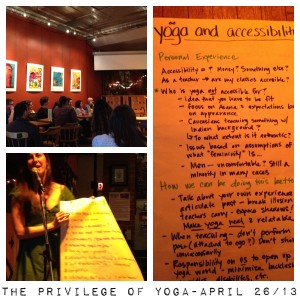Download the notes in PDF form here. 
(Summary notes from discussion groups at the April 26th dialogue at Rhizome Café. Please excuse any mistakes in translating notes from written to typed form.)
Topic 1: Yoga and White Privilege/Heteronormativity
– Yoga as a tool for increased awareness and Character Development
– Yoga cultivating emotional intelligence
– Studios minimize emotions / don’t feel there is permission not to feel good
– Yoga and a sense of sharing / purity / minimizing of individual expression
– Are smaller studios better able to invite a variety of expressions?
– Teachers responsibility to create a safe space that allows for complexity of expression
– Hurt, sit with discomfort, and create community
– Yoga is an opportunity to explore our own fallibility
– Authentic teachers vs a sense of purity
– Sell something different than the mainstream.
– Positive practice / not doing the work.
– Healing from pain, healing from addictions (especially eating disorders)
– Conformity is abuse
– As a teacher, yoga is informed by educational models
– Began teaching as a compliment to physical fitness
– Evolution of practice – moved from physicality to spiritual practice – journey of doing
– Financial requirements
– Importance of providing context – culture reinforces imbalance, what are external factors that perpetuate violence
– Instances of yoga projection onto students
– Importance of creating safe space for discomfort and complexity
– Teachers need to be aware of their use of power
– We are all struggling
– Courage to Teach resource – Parker Palmer
Topic 2: The Authenticity of Modern, Vancouver Yoga
– Educating ourselves about the colonial history of the practice
– Power and flow yoga brings people in
– Yoga as… pleasure. A “fix”. A distraction. Performance.
– As a teacher, being authentic. Teaching from your own experience.
– Tracing back to a lineage – where does “vinyasa power flow” come from?
– What you need, what feeds you, changes over time.
– Slowness makes people uncomfortable, trying to balance what people want.
– Opportunity to connect to your physical experience is essential to connecting to everything else.
– Certain styles don’t facilitate connection, feeling emotions, physical experience.
Topic 3: Capitalism
– Is studio space necessary?
– “Lifestyle” yoga
– Ethical + business = ?
– “Big Box Yoga” and “The Yoga Factory”
– What does sustainability look like for teachers? For businesses?
– Alternative ways to pay
– Moving toward a system where healing and preventative practices like yoga are included in healthcare – systemic changes needed
– Sharing the costs and profits – in a business model and/or as a larger society
– Celebrity culture / fame. A need to develop a following, in order to make the job of teaching sustainable. But it’s such an awful game to have to play.
– Cult of Personality vs… innovation?
– Competition
– Alternative to “guru” or “1 person teacher” – education more broadly / power dynamics
– Cost of teacher training a barrier – impacts who teaches
– Yoga philosophy vs capitalist philosophy
Topic 4: Yoga and Accessibility
Personal Experience:
– Accessibility = ? Money? Something else?
– As a teacher – are my classes accessible?
– Who is yoga not accessible for?
- Idea that you have to be fit
- Focus on asana and expectations based on appearance
- Caucasians teaching something with an Indian background? To what extent is it authentic?
- Issues based on assumptions of what ‘femininity” is…
- Men – uncomfortable? Still a minority in many cases
How can we be doing this better?
– Talk about your own experience – articulate past – break illusion that teachers carry and expose shadows!
– Make yoga real and relatable
– When teaching – don’t perform full pose (attached to ego?). Don’t show off unnecessarily
– Responsibility on us to open up the yoga world – minimize backlash against minorities, disabilities, ect
– Create initiatives to increase accessibility
– Receive education from those groups you want to better understand
– Bridge Indian community and yoga studios as they currently exist
– Where we practice – give feedback regarding these issues. Not feeling safe, language issues, ect.
– By donation classes at studios – manage these better. Always serving students with new teachers?
